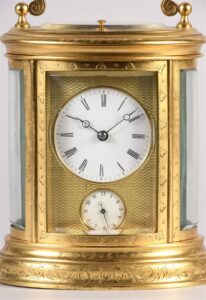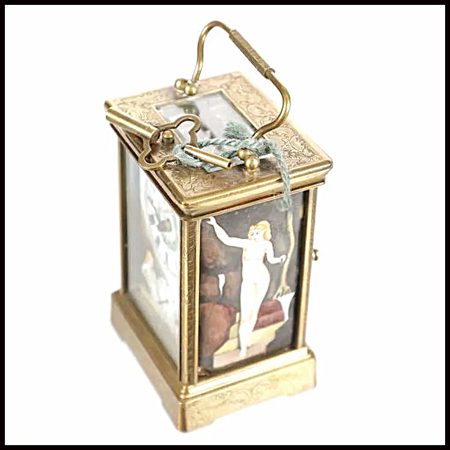French carriage clocks are among the most elegant creations ever produced in the world of horology. Compact yet refined, these little masterpieces carry both artistry and precision in equal measure. Whether sitting on a mantel, displayed in a cabinet, or ticking softly beside a writing desk, French carriage clocks remind us that beauty and function can share the same space. For collectors, decorators, and those who simply love the feel of something timeless, French carriage clocks remain irresistible.
The Art of the French Carriage Clock

During the 19th century, French carriage clocks were the preferred travel companions of Europe’s elite. These portable timepieces were often encased in polished brass or gilt bronze, featuring beveled glass panels and finely detailed enamel dials. They weren’t merely practical tools for keeping time on long journeys; they were personal statements of taste and refinement. Even now, a vintage French clock exudes that old-world sophistication modern designs can’t quite capture.
Collectors appreciate how French carriage clocks often reflect the artistry of their makers. Many were hand-assembled by master clockmakers in Paris, where precision engineering met ornate design. Some feature decorative handles, others intricate engravings or chime mechanisms. Each detail—down to the smallest screw—tells a story of craftsmanship from an era when timekeeping was an art form.
The Appeal of the Vintage French Clock
Today, the vintage French clock represents far more than a way to tell time. It’s a link to history, to a slower age when things were made to last. A vintage French clock on display instantly draws the eye and elevates the room’s character. Collectors find these clocks appealing not just for their mechanical precision, but for their patina, wear, and unique imperfections that speak of decades, even centuries, of existence.
When you hold a vintage French clock, you can almost imagine the journeys it’s taken—packed in a carriage, ticking faithfully across cobblestone roads, perhaps accompanying diplomats or merchants as they moved between cities. The same clocks now rest in collections, admired as rare antique clocks that embody history, beauty, and endurance.
What Makes French Carriage Clocks Unique
Unlike wall or mantel clocks, French carriage clocks were designed for mobility. They were among the first portable mechanical timepieces that offered both accuracy and aesthetic appeal. The classic rectangular case, with its glass sides and brass frame, allows the viewer to admire the movement within—a fascinating interplay of gears and springs working in perfect harmony.
Collectors often seek French carriage clocks signed by notable makers such as Breguet, Drocourt, or Jacot. These names symbolize impeccable engineering and design excellence. Many of these French carriage clocks still function flawlessly after 150 years, needing only occasional servicing to continue their steady rhythm. The combination of beauty, portability, and reliability makes them stand apart from other rare antique clocks.
Investing in French Carriage Clocks
The market for French carriage clocks has remained strong because of their lasting value. Each piece tells a story and represents a chapter in horological evolution. As more collectors recognize their charm, well-preserved examples of French carriage clocks have become increasingly sought after. Whether you’re drawn to the gilded ones with enamel faces or the plainer models that focus on mechanical purity, these clocks are considered smart investments.
Those who appreciate rare antique clocks know the importance of authenticity and condition. When purchasing, one should look for original glass, movement stamps, and a clean ticking sound. Expert restoration can maintain functionality, but untouched pieces often command higher prices due to their originality.
Caring for Your Old Vintage Clock
Like any fine mechanical instrument, an old vintage clock requires gentle care. Keep it in a stable environment—away from humidity and direct sunlight—and have it serviced by a professional every few years. The brass casing of French carriage clocks can be polished lightly, though many collectors prefer to preserve the aged patina that adds to its charm.
An old vintage clock should never be overwound, and it’s wise to handle it with care, especially when transporting. When properly maintained, French carriage clocks can outlast generations, becoming family heirlooms that carry not only time but memories. Many owners of old vintage clock collections take pride in passing them down, knowing they’ll continue to enchant the next caretaker.
The Lasting Allure of French Carriage Clocks
In a digital world, French carriage clocks remind us that true luxury lies in the handmade. Each tick is a whisper from the past, each gleam of brass a reminder of human craftsmanship at its best. They are living antiques—French carriage clocks that bridge the centuries and prove that beauty, once made, never goes out of style.
Whether you’re a dedicated collector or simply appreciate the elegance of an old vintage clock, there’s no denying the magic of these small but mighty works of art. French carriage clocks are not just instruments of time—they are keepers of history, guardians of craft, and symbols of enduring taste.


